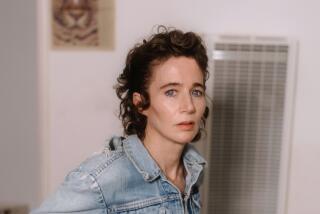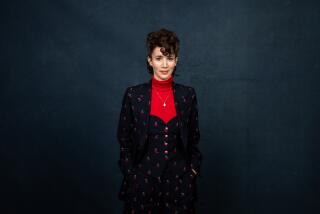Her own lights, camera, action
When, on her third try, Miranda July finally got into the Sundance Screenwriting Labs, she had already established herself as a performance and video artist and was eager to turn her attention to a narrative feature film project. At Sundance, she says, people were aware of her fine-art background as well as her outspoken decision to make a movie her own way -- as a hybrid of conventional features and the dreamy landscapes of her earlier work. So they approached her a little differently than they would someone trying to write the next “Pulp Fiction.”
“People knew I was pretty skeptical. They would sort of be like, ‘Do you know about three-act structure?’ ‘No.’ ‘Well, are you interested?’ And I’d be like, ‘Tell me what it is,’ and then I wouldn’t be,” she said in the slightly spacey, drawn-out way one might expect from someone who grew up in Berkeley, then spent some 10 years in the artist-friendly environs of Portland, Ore. (July recently moved to Los Angeles.)
As the filmmaking process went on, she came to appreciate some of the rules of narrative filmmaking. “I was more interested in structure when I got to the editing stage,” she continues. “I did have some vague ‘Oh, yeah’ -- I kind of got why people would approach it that way, even though I probably never would.”
The film she created, “Me and You and Everyone We Know,” screens at the Los Angeles Film Festival this week and arrives in theaters Friday bearing as fine a pedigree as any film of the season: After its January premiere at the Sundance Film Festival, “Me and You” was given a Special Jury Prize for “originality of vision,” then received four prizes at the recent Cannes Film Festival and has picked up a handful of other festival awards.
July’s previous work, which has twice been included in the prestigious Whitney Biennial, would likely fall into the category of “mixed media”; as the bio on her website puts it, “Miranda July makes movies, performances, recordings and combinations of these things.”
For “Me and You,” July, 31, served as writer, director and lead actress, playing an aspiring artist who falls for a single dad/shoe salesman played with uncanny charm by “Deadwood” actor John Hawkes.
Along the way, strange incidents and intersections draw a seemingly disconnected circle of neighbors and co-workers closer and closer. Some of the film’s most provocative moments explore the emergent sexuality of a group of children, including a rather charming exchange in cyberspace between a 7-year-old boy and an unknowing prospective (and full-grown) paramour. In someone else’s hands, these scenes might seem exploitative or off-color, but July manages to present them as gentle, tentative steps into a new world.
“I judged my own intentions,” she says, in describing how she tried to discern when she might be crossing the line into the inappropriate. “I might need more room than exists in the culture to feel different things. I wanted to trust myself enough to not make it totally black and white.”
And she didn’t shy away from material that reflected her own past. Her character is an artist who can’t get her work into a local show, and there is some humor at the expense of an art curator. While she admits she had second thoughts about some of the art world themes, she ultimately decided they were valid: “My thing isn’t more weird than anyone else’s thing.”
In the end, July sees “Me and You” as occupying a space that pushes “the commercialization of more experimental stuff.....I really wanted it to be a very normal movie.”
As she wrote the script, rather than relying on some preconceived notion of plot or what the movie might be “about,” July let her feelings guide her, creating the heavily articulated mood and tone that are the film’s biggest strengths -- and presumably the factor that has set it apart from other quirky-on-purpose indie romantic comedies.
“When I sat down to write each day,” she says, “I would think, ‘What is the feeling of today? What’s particular about my life right now?’ And I would just trust that. It doesn’t really look like it, but the film really is very much about me now, kind of laid over the characters.
“I would start from there, and sometimes that required a new character or a totally new direction. I would do this sort of detective work, looking at the scene and thinking, ‘I wonder who this person knows.’ It was almost as if the story had already been written, and I was this sleuth who had to uncover it.”
More to Read
Only good movies
Get the Indie Focus newsletter, Mark Olsen's weekly guide to the world of cinema.
You may occasionally receive promotional content from the Los Angeles Times.











